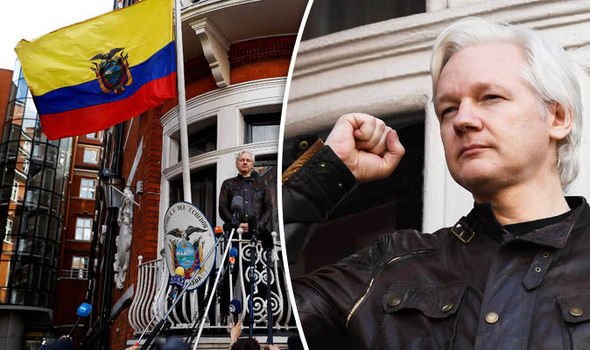
- WikiLeaks founder Julian Assange became an Ecuadorian citizen in December
- On Tuesday, the talk was that he may be expelled from the Ecuadorian embassy
- But it was then revealed that Assange had received an Ecuadorian passport
- Ecuador asked London to recognise Assange as a diplomat but Britain refused
- Assange, 46, posted a pictured of himself wearing an Ecuadorian football shirt
Ecuador has granted citizenship to Julian Assange, who has been living in asylum at the nation’s embassy in London for more than five years to avoid arrest.
The WikiLeaks founder became a citizen of Ecuador on December 12, and now the country is seeking a ‘dignified and just’ solution with the British Government, as Assange continues to live in its London Embassy.
Foreign Minister Maria Fernanda Espinosa announced Thursday that Ecuador had asked London to recognise Assange as a diplomat – which would give him safe passage out of the embassy without fear of arrest – but Britain had refused.

‘The Ecuadoran government is empowered to grant nationality to the protected person and thus facilitate… his inclusion in the host state,’ Espinosa told reporters.
She said the request to Britain to accept diplomatic status for Assange was made on December 20, and denied a day later.
The foreign minister said Quito would not insist further on the issue because of the ‘good relations we have with the United Kingdom’.
The British foreign ministry said in a statement that Ecuador had ‘recently requested diplomatic status for Mr Assange here in the UK. The UK did not grant that request, nor are we in talks with Ecuador on this matter.’
News of his naturalization comes a day after he it was revealed he had been given an Ecuadorian passport.
Assange posted a picture of himself wearing an Ecuador football shirt on Wednesday, which added to the speculation he had been received citizenship.
El Universo quoted reliable sources who confirmed the passport document, numbered 1729926483, was issued to a Julian Paul Assange in December.
His name appeared on Ecuadorian Internal Revenue Service, and his file read ‘the citizen/taxpayer has no information registered in the database or recorded by third parties’, according to the paper.
An FCO spokesman said: ‘The Government of Ecuador recently requested diplomatic status for Mr Assange here in the UK.
‘The UK did not grant that request, nor are we in talks with Ecuador on this matter.
‘Ecuador knows that the way to resolve this issue is for Julian Assange to leave the embassy to face justice.’
Ecuador’s foreign minister, Maria Fernanda Espinosa, said: ‘No solution will be achieved without international cooperation and the cooperation of the United Kingdom, which has also shown interest in seeking a way out.’
A United Nations panel concluded in 2016 that Mr Assange was under arbitrary detention.
A statement by Mr Assange’s legal team said: ‘The UN ruling, issued almost two years ago, is crystal clear in its language. Mr Assange is unlawfully and arbitrarily detained by the UK authorities and must be released.
‘The UK should not permit itself to be intimidated by the Trump administration’s public threats to “take down” Mr Assange.’
Assange moved to the embassy in Central London in 2012 as he tried to avoid extradition to Sweden over charges of rape and sexual assault.
But last year, the Australian, 46, angered Ecuadorian president Lenin Moreno by tweeting support for Catalan separatists.
On Tuesday, Ecuador’s foreign minister Maria Fernanda Espinosa said Assange’s stay had become ‘untenable’ and she was seeking a mediator’s assistance.
The charges against Assange have been dropped by Swedish prosecutors due to the impossibility of serving him notice, but the Metropolitan Police, which spent millions of pounds maintaining watch over the embassy, said he still faced a charge of failing to surrender to a court.



Be the first to comment